Written by: Kalin Goble
Adults deal with a daily bombardment of circumstances they must process. We are facing overstimulation and mental fatigue on a daily bases due to dealing with:
- Increased demands in changing work environments/expectations (work-life balance)
- A surge in living costs
- Escalation of community violence
- And the impacts of new outlets and social media platforms
Additional mental health impacts are added when considering military-connected parents (service members and on military spouses).
Adults, and parents/caregivers specifically, are the key to youth developing empathy, compassion, and positive social behaviors and responses. Counselors, therapists, case managers, and mental health service providers often serve as figures of support for adults and their children. Parents/caregivers should discuss the importance of open communication and healthy boundaries while creating safe environments that encourage openness and understanding with their children. This is especially true for parents whose children are impacted by or exhibit problematic behaviors.
One such harmful behavior is bullying. Bullying transcends age and geography and is a social problem that most youths face at some point in childhood. The impact of bullying, like most harmful behavior, has the potential to have lasting mental, emotional, and well-being consequences. Thus, it can present a cacophony of feelings for parents when their child is involved in this behavior.
Below are a few guidelines for offering support to parents/caregivers whose youth are experiencing (or impacted by) problem behaviors,
- Create space for youth to be heard without immediate negative responses, such as getting upset (or other heightened reactions) at hearing one’s child has been bullying a classmate. Communication, social norms, and expectations vary across families. But creating a family culture of open communication, respect, and a space to listen increases the likelihood that your child will confide in you. Whether they are being impacted by, or are themselves involved, in a problem behavior.
- Knowing where to find support. We have all been kids. Most of us have experienced problem behavior, such as bullying, in childhood. Our history, oftentimes, impacts our parenting behavior. As parents, compounding anxiety and stress with what your youth is experiencing can be difficult. Knowing what social supports (professional, community, family, or unit) are available strengthens one’s ability to navigate these tough parenting situations.
- Equipping parents with resources and strategies. When supporting parents, gaining knowledge through resources and tools can empower them to be prepared and feel confident when navigating difficult conversations. The Clearinghouse for Military Family Readiness at Penn State has a suite of free resources for parents within their Thrive Modules. Their Harmful Behaviors: Recognize. Respond. Repair. course is a parent-education module. This course is designed to “help parents and caregivers establish healthy family habits to prevent problems, examine past and present experiences that may influence social interactions, identify the support networks in children’s lives, identify harmful behaviors, and offer strategies on how to respond appropriately.” Parents will be prompted to reflect on their own experiences, given strategies for talking to their child, and provided handouts on strategies and talking points.
For support over developmental stages, the Thrive program’s Take Root (0-3 years old), Sprout (3-5 y/o), Grow (5-10 y/o), and Branch Out (10-18 y/o) Initiatives detail how to best engage and support youth at every age range.
By bolstering parents’ education, professionals can help them navigate difficult parenting experiences with resilience and a sense of confidence.
Below are a few OneOp resources that may also assist service providers when having these conversations with parents.
OneOp Resources:
- Webinar Series| Military Youth: Protecting and Promoting Resilience and Well-Being
- Webinar Series| Collaborative Connections: Working Together for Military-Student Success
Blog Post Image: Pexels [Troubled Woman with Therapist by World Sikh Organization of Canada, Jul 29, 2022, CC0]













